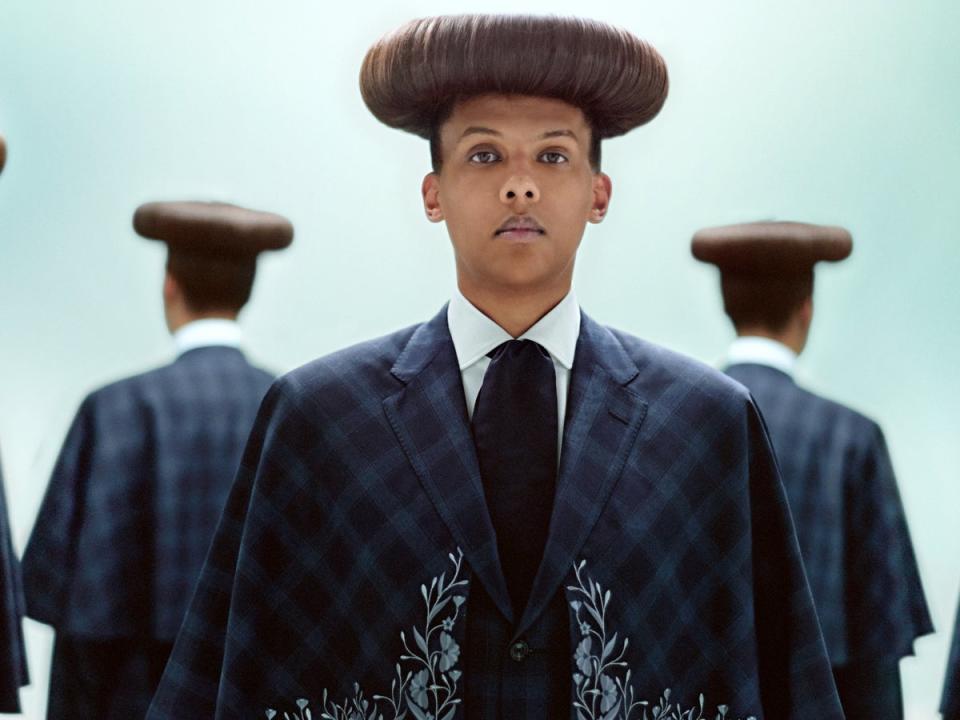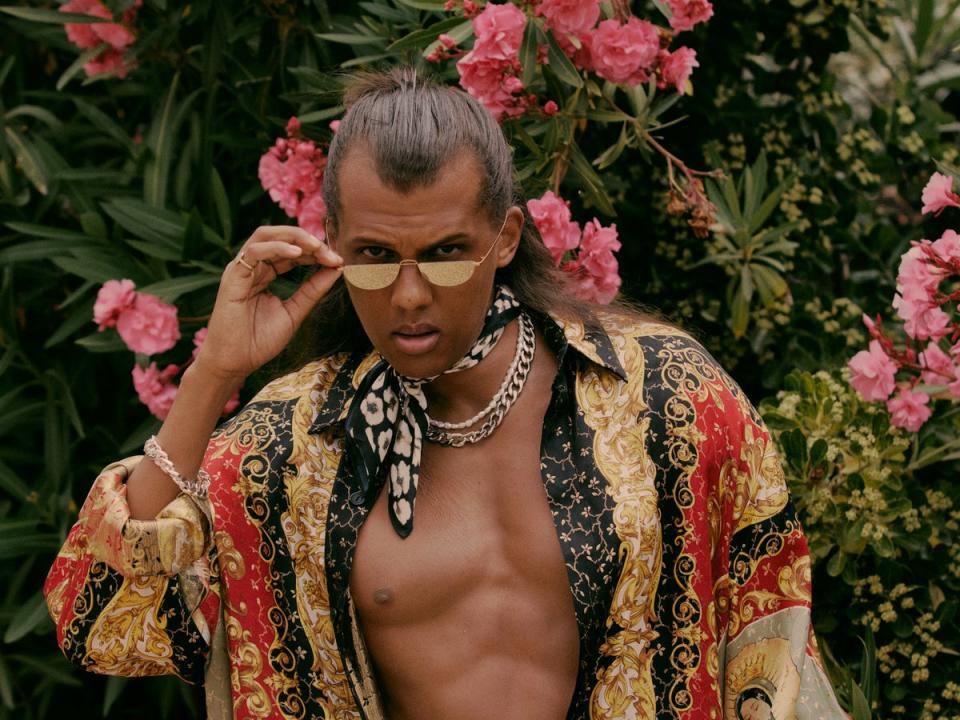Stromae: ‘No one told me I was a one-hit wonder. I was saying that to myself’

Stromae likes to put himself in unusual situations. In 2013, the Belgian-Rwandan musician stumbled drunkenly around a rain-soaked street in Brussels, as passersby stared or filmed him on their phones. “Had a tough night?” a concerned police officer asked him. “I’m a big fan of yours… take care.” The footage of these real-life scenes became the music video for his single “Formidable”. Two years later, he dressed up in a flamboyant shorts and shirt combo (with matching socks), clambering out of a yellow cab while announcing that he planned to “meet all [his] American fans”. He performed to a deserted Times Square, later dragging his laptop and keyboard through the subway. This was the music video for “Papaoutai”.
Still, the artist born Paul Van Haver felt distinctly out of place at this year’s Met Gala, in May. “It was stressful, my first time,” he says. He has no real interest in the world of celebrity – “I live in Brussels, there are no celebrities there,” the 37-year-old jokes. So finding himself flanked by Signourey Weaver and The Queen’s Gambit actor Anya Taylor-Joy – talking to Riz Ahmed about his new documentary and receiving compliments from Billie Eilish, Stormzy and Camila Cabello – was odd, even for him. It speaks to Stromae’s status in the music industry, as an anomalous, enigmatic genius – an exceptional rapper, singer, composer, producer and multi-instrumentalist – that the New York glitterati were flocking to pay tribute. They’d probably missed him.
Released in January, Stromae’s third album Multitudes marked his first studio release in nine years. Before that hiatus, he had already asserted himself as that rarest of things: a French-speaking, international star. “Alors on Dance” – from his 2010 debut Cheese – was a pulsating club anthem with lyrics that spoke to a generation brought low by unemployment, debt and social apathy, delivered in a morose drawl that drew comparisons to Stromae’s fellow Belgian, Jacques Brel. It charted at No 1 in 19 countries. Such is its popularity that, just last year, producer Joel Corry and alt-pop queen Charli XCX sampled it for their own hedonistic banger, “Out Out”. In a recent interview, Stromae said the success of “Alors on Dance” was so overwhelming, he was told he’d be a one-hit wonder. “I put a lot of pressure on my shoulders,” he says now. He’s folded his gangly frame into a low-slung sofa; we’re speaking post-soundcheck in an otherwise empty tent, behind the gargantuan main stage at Nos Alive festival in Lisbon, Portugal. “I don’t even remember anyone saying to me, ‘You’re a one-hit wonder,’” he admits. “I was saying that to myself.” Yet he soon proved himself wrong.
His second album, 2013’s Racine Carrée, included the frenetic single “Papaoutai” (“Daddy where are you?”), another hit. This time, he delved into the identity of the father figure (Stromae’s father was killed in the 1994 Rwandan genocide) over jangling, Nina Simone-indebted keys, juddering synths and Afrobeat melodies: “Dites-nous qui donne naissance aux irresponsables?/ Ah, dites-nous qui, tiens/ Tout le monde sait comment on fait des bébés/ Mais personne ne sait comment on fait des papas.” (“Tell us, who gives birth to the irresponsible?/ Ah, tell us who, well/ Everyone knows how babies are made/ But nobody knows how we make dads.”
It was in 2015, while Stromae was touring that album around Africa, that everything collapsed in on itself. He suffered serious side effects from an anti-malarial treatment; after a blackout onstage, he pulled the tour altogether. He’s spoken of experiencing suicidal thoughts in the aftermath, of paranoia and hallucinations. Slowly, he began to recover. He married his longterm partner, designer Coralie Barbier (who styled him for the Met Gala) in 2015 – together they welcomed their first child, a son, three years later. It was around then that work began on Multitudes, in the new studio Stromae built in Brussels, but he tells me he never stopped making music in his time away from the spotlight. “I already knew I was going to take this direction [for the album], since I finished Racine Carrée,” he says. In these nine years, he doesn’t seem to have aged, with his androgynous appearance, sharp cheekbones and startling green eyes. “I just needed a rest, to live my life, because [until then] I had nothing to say.”
What was immediately apparent on hearing Multitudes was that Stromae had lost none of his astuteness, or his ability to tap into the anxieties and contradictions of the day. In 2013, French newspaper Le Monde called him an antenna: “He pulls in signals – the crisis, AIDS, the environment, misogyny, Twitter, false richness – from his Brussels control tower.” What Stromae transmits back to his audience is a subverted interpretation of those themes. A new version of “Mon Amour”, his collaboration with fan and fellow artist Camilla Cabello, is delivered from the perspective of a sleazy cheat trying to convince his current girlfriend that he won’t stray. Cabello joins him for the video, too, which is set in a Love Island-inspired villa where the contestants are eliminated in sinister ways. On “Fils de Joie”, which samples the Baroque-style toccata used in the Bridgerton teaser trailer, he sings from the perspective of a sex worker’s son. And over the squelchy, squeaking dance beats of “Santé”, he pays tribute to the people left to clean up once the party’s over.

“I wanted to make a party song, but something different, so I wrote about the people who are working while we party,” he tells me. “I thought about [my cleaner] Rosa first, and Alberto who works in my house, and the rest are characters. I’m singing in the voices of the bad, horrible customers we could be. I wanted to celebrate Rosa and the others.”
Right now, Stromae is warm and jovial, often punctuating his remarks with a burst of rich laughter. But in other interviews, he’s allowed his creativity – and unpredictability – to run wild. Announcing his comeback in January, he appeared on the popular Sunday-night broadcast of French news channel TF1. At first, it seemed like a typical chat: Anne-Claire Coudray noted how his mother took the family around the world – from Mali to Mexico – explaining in part Stromae’s eclectic, globe-spanning sound. Then she asked about his mental health, and whether his music helped liberate him from feelings of loneliness. The tone changed. Soft piano chords kicked in, and Stromae looked to camera. He began to sing.
It was a live performance of his single, “L’Enfer”, a brutal, unsparing account of his struggles with depression. “I’ve considered suicide a few times and I’m not proud of it,” he admitted. It was profound, visceral, moving. Yet in France, a debate was sparked over whether this was an insult to the integrity of journalism, to allow a musician to air what some deemed an “advert” during a news broadcast. “I was surprised by the reaction, but at the same time I was really happy to have the support,” he says. And, as he points out: “I love to do things differently.”
Multitudes is the apotheosis of that creative approach, to meld folkloric music with French chanson, or a genteel-sounding harpsichord with the grooves of Brazilian favela funk. These influences, imbued with a sense of community and storytelling, are frequently juxtaposed with themes of isolation, of disenfranchised or despicable characters. “Déclaration” interpolates the melody from “Colours of the Wind”, from the Disney film Pocahontas, as Stromae empathises with his wife for the misogynist world she lives in. “That was the goal, the mix,” Stromae says. “That was really important to me.” He’d love to be able to sing in English, “but I can’t and I think I’m more sincere [when I sing in French] – even for non-French audiences, they can feel the sincerity when you sing in your language, more than if you try another one. So it was important for me to take this direction.”
Audiences can feel the sincerity when you sing in your own language
Stromae
“Déclaration” almost didn’t go on the record, because Stromae is that averse to the idea he might be tapping into any “trend” – in this case the post-MeToo discourse. “It’s so big now, this issue, so I didn’t want to be like, cashing in, but in the end I thought this is just my point of view,” he says. And, as I point out, his song will be relevant for some time.
The final two songs on the record are twins, one sad, one happy. “C’est que du bonheur” (“Nothing But Joy”) celebrates how Stromae’s love for his son saved his life via poo-filled nappies and vomit everywhere. It’s perhaps the purest expression of the album’s overarching theme: with the ups come the downs, and vice versa. Life contains multitudes, and so does Stromae.
‘Mon Amour’ ft Camila Cabello is out now

